After Sir James Killen’s funeral I was talking to Archbishop Bathersby who remarked that there would never be another service in Queensland like that one. I had to agree. The present Governor-General, the Prime Minister, three former Prime Ministers, two former Governors-General, the Queensland Governor, the Premier and Deputy Premier, the Minister for Defence, members of the Federal Senate, the head of the Defence Force, Church leaders and leaders of Industry, Supreme, Federal and District court Judges, lawyers and other friends in their hundreds all attended. The congregation overflowed into the grounds of the Cathedral and onto the footpath in Ann Street. There is no possibility of a repetition of such a gathering.
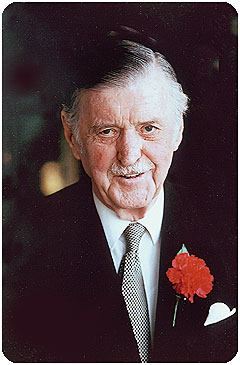 A member of the Bar told me that he admired Killen because Killen always recognised him and spoke to him. That is a common response. That was his style. To walk down the street with him was an experience. He would be stopped every twenty metres with people wishing him well. They all loved him. He had a rugged face and a typical Air Force moustache which made him instantly recognisable. He was regularly sought for comment in newspapers and on television. He had a very public profile. His image was a “household word” one might say.
A member of the Bar told me that he admired Killen because Killen always recognised him and spoke to him. That is a common response. That was his style. To walk down the street with him was an experience. He would be stopped every twenty metres with people wishing him well. They all loved him. He had a rugged face and a typical Air Force moustache which made him instantly recognisable. He was regularly sought for comment in newspapers and on television. He had a very public profile. His image was a “household word” one might say.
He entered Parliament in 1955, finishing his degree in law whilst a backbencher and was called to the Bar in 1964. His career at the Bar was interrupted by his ministerial life. In the early days when only a backbencher, he did a bit of everything but probably mostly crime. His compassion was always evident. He had done it tough as a lad, and when about 15 he ran away from Brisbane Grammar School. He went west and became a jackeroo. That experience shaped his later life and nurtured the common touch and generosity of spirit for which he became noted.
He enjoyed an early triumph at the Bar. It occurred when his client was charged with obscene language. The defence was that the language was not the defendant’s but his parrot’s. It had learnt a few obscenities in the course of a long life. When it came to the defence case Killen tendered the parrot. It obliged with some ill chosen words and the complaint was dismissed.
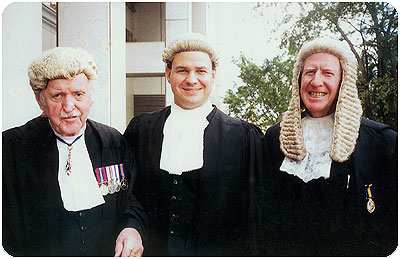 His peers at the Bar, in the early days, treated Killen with mild amusement. Many took the view that his kind of advocacy belonged more to the other place. Yet he was successful in a variety of actions, so Judges and juries must have seen him differently.
His peers at the Bar, in the early days, treated Killen with mild amusement. Many took the view that his kind of advocacy belonged more to the other place. Yet he was successful in a variety of actions, so Judges and juries must have seen him differently.
When he obtained a Ministry his legal pursuits ceased, but after his retirement from Parliament in 1983 he was back at the Bar in all his glory. Pleas of guilty were his forté. His submissions were irresistible. Courts were delighted to note his presence. Magistrates were mesmerised by him. I led him for the Plaintiff in a medical negligence case in the early 1990’s. The trial Judge welcomed him and remarked that it was wonderful to see him back before the court. An appearance in the Court of Appeal a few years later brought a similar response.
His career in politics was stellar. The Defence Ministry suited him admirably and he was on top of his portfolio. Prior to 1976, hundreds of officers had been commissioned but their commissions had not been prepared, some had been waiting since at least 1968. Jim arranged that all commissions be executed and distributed. This may not be a particularly important matter but several ministers before him had not managed it.
An important accomplishment was the purchase of the FA18 aircraft. The competition had been between the famous “Tomcat” (the F15) and the other. The Tomcat was a super fighter plane, and when your force had plenty of heavy aircraft as well, it was tops. Australia needed something with a bit of both types, a fighter and a bomber and so Jim made his choice. It was the largest purchase, in monetary terms made by Defence to that time — hundreds of millions of dollars. MacDonnell Douglas showed its appreciation by giving Killen a neck tie. Modern politicians should take note!
His repartee in Parliament is legendary. but a litany of stories is not appropriate here. One should be retold. Brian Toohey the Canberra journalist had raised hackles in Parliament by a particular report. Killen commented that in his experience Mr Toohey, “could not be relied upon to report accurately a minute’s silence”.
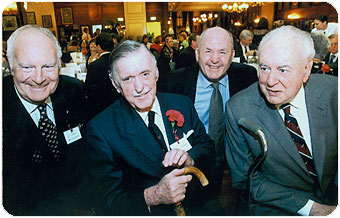 He had a wonderful eightieth birthday party at the Irish Club. Gough Whitlam spoke and so did Alexander Downer. Gough was Gough of course, and Downer’s words were marvellous, yet he had not been in Parliament with Jim. Downer climbed off a plane from Korea, came to the Club, made the speech and was off again. Others spoke too, the Irish Pipe Band played, Irish Dancers danced and Brian Nason added a touch of Australiana with “The Man from Snowy River”. (Tony Morris was late). It was the best night.
He had a wonderful eightieth birthday party at the Irish Club. Gough Whitlam spoke and so did Alexander Downer. Gough was Gough of course, and Downer’s words were marvellous, yet he had not been in Parliament with Jim. Downer climbed off a plane from Korea, came to the Club, made the speech and was off again. Others spoke too, the Irish Pipe Band played, Irish Dancers danced and Brian Nason added a touch of Australiana with “The Man from Snowy River”. (Tony Morris was late). It was the best night.
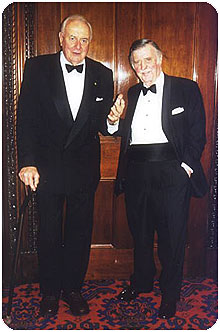 Lord Denning ranked amongst his friends. Denning inscribed the first of his quintet of autobiographical tomes for Sir James. George Bush senior also shared his friendship. James had flown in US Air Force 2 when Bush senior was Vice President. He was a close friend of several members of the Dixon & Barwick Courts, especially Barwick, Menzies and Taylor. One might perhaps feel that Killen related best to the “larrikin” element on the Court.
Lord Denning ranked amongst his friends. Denning inscribed the first of his quintet of autobiographical tomes for Sir James. George Bush senior also shared his friendship. James had flown in US Air Force 2 when Bush senior was Vice President. He was a close friend of several members of the Dixon & Barwick Courts, especially Barwick, Menzies and Taylor. One might perhaps feel that Killen related best to the “larrikin” element on the Court.
He was a favourite for eulogies and his contribution was always full of generosity and warmth. He delivered the eulogy at the funerals of Sir Garfield Barwick, Senator Neville Bonner and General Sir Arthur McDonald and at so many others that there hardly seemed a week pass, that he was not at a funeral. He said he would have to start charging appearance money. I attended with him on several occasions. He sang lustily and was staunchly devout. It was part of his spiritual life. Worship was important to him.
His charity of thought and speech was signal. I would rail against someone for a gross breach of decorum. He would excuse the breach by saying it was mere “social exuberance”. Criticism was not in his makeup no matter how blatant the offensive behaviour.
He was asked incessantly to give references or to intercede for friends or friends of friends. He lent his help generously and his intercessions were always with sincerity and concern. He received a torrent of mail from people seeking his help. He was forever phoning or writing to Officials. Organisations as diverse as the Border Collie Club of Queensland, the Queensland Jockeys Association, the 139 Club and the Guards Association proudly boasted his patronage. There were others. He had thousands of friends and was loyal to them. They reciprocated.
He liked to talk of his appearance in the High Court in Anderson v Liddell & Ors [1968] 117 CLR 36. He was but a callow junior and was opposed by the august Sir Arnold Bennett QC leading Alan Demack. He did not win but from his description I gather Sir Arnold had some worrying moments. In another High Court matter, Killen was led by Senator Condon Byrne so political logic (if there is such a thing) would have been much to the fore. He related how the members kept stopping Byrne and conducting discussions between themselves. When it came to 4.30pm Dixon CJ asked how long Byrne expected to be the following morning. “A further hour,” was Byrne’s response. “That long?” responded the Chief Justice; “of course we’ve been interrupting you.” “Not at all Your Honour” was Byrne’s reply. “We had the distinct impression that we were interrupting the Court.”
He loved horse racing. He was not a big punter but he was a dedicated one. Over the years he owned a number of horses with Eddie Broad (later Judge Broad) and his great friend Jim Kennedy. For years he went to Melbourne for Derby Day and the Melbourne Cup, but unlike a certain Bob Douglas (sadly now deceased) he sometimes backed a loser.
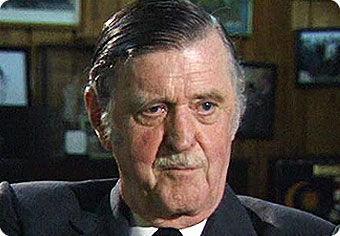 He sat on the Racing Appeals Tribunal for some years in the late 1990s and early this century. Mr Leo Williams was Chairman and Mr Dennis Standsfield the second member. Sir James was a “softie” when it came to penalising owners, trainers etc. The other Tribunal members had to keep a tight rein. He would tell me of the hearing and when referring to the penalty would invariably add “The poor beggar”. One greyhound owner said he had his dog in the car and would like to bring it into the court. “You would get on well with him,” he told Killen, “you have similar personalities”.
He sat on the Racing Appeals Tribunal for some years in the late 1990s and early this century. Mr Leo Williams was Chairman and Mr Dennis Standsfield the second member. Sir James was a “softie” when it came to penalising owners, trainers etc. The other Tribunal members had to keep a tight rein. He would tell me of the hearing and when referring to the penalty would invariably add “The poor beggar”. One greyhound owner said he had his dog in the car and would like to bring it into the court. “You would get on well with him,” he told Killen, “you have similar personalities”.
He was one of the Government’s nominees at the Constitutional Convention in February 1998. His address followed Mr Neville Bonner’s (formerly a member of the Senate). Bonner ended with a chanted lament. The effect was electrifying. He received a standing ovation with prolonged clapping. To follow him was a challenge which few could have successfully accepted, but Sir James was equal to the task. With supreme sensitivity and judgment he first took the Bonner theme, continued it for a little, (he must have composed this on the spot) then turned to his own thoughts which were delivered (as was common for him) without notes. It was a superb effort.
Much time was taken up on the lecture circuit. He delivered “A Reflection”, the R D Sherington lecture in 1994, “Humanity & Technology: “Where is the Master”, the David Boughen Memorial Lecture in 1995, “Our Fragile Liberty”, at the Conference of Prison Chaplains in 1996, “Is Parliament Expiring”, the Professor Tess Brophy lecture in 1996, “A Passing Shadow”, the Churchill Lecture in 1998 and “Speech is of Our Time”, the Dr Allan Martin lecture in 1999, to name but a few. He took enormous pride in researching the topics and delivering the lectures. Nothing less than a perfect performance would suffice.
After his return to the Bar we had a civil jury trial acting for the Plaintiffs and Killen knew one of the jurors quite well (you could not have drawn a panel without him knowing someone on it). I asked Killen how he knew him, “From the races” was his reply. I asked what he did, “He’s tied up with Insurance”. “What the hell did you let him on for”, I asked, a bit annoyed. “Well he’s good with figures and we need someone to divvy up the damages”.
Killen fired another bon mot in the course of that trial. Ron Ashton was on the other side and when he turned up early one morning (a novel event for Ron), Killen said, “Good morning Ron, that is a wonderful organisation you run”. Ashton not unnaturally and in the context of legal affairs took the remark as a reference to Minter Ellison, where Ron was the Managing Partner, and thanked Jim for his remark, “Yes” Killen continued, “They came and changed a tyre for me yesterday”. Ashton was President of the RACQ at the time.
Des Draydon when a member of the Inns 20th level (where Killen had chambers) organised a party for Jim’s 70th Birthday. It was held at the Guineas Room at Eagle Farm with a star studded cast. Whitlam and John Gorton both spoke beautifully of this character who was gracious to all and loved by all. Joy, his first wife, also spoke. Draydon thoughtfully called the occasion “A Knight of no Divisions”.
The Bar’s sympathy is extended to his wife Benise, to his daughters Diana and Heather and to his sister Dawn. DENIS JAMES KILLEN AC KCMG, the knight of no divisions, will be missed by all.
James Crowley QC
To comment on this article in the Hearsay Forum, click here.


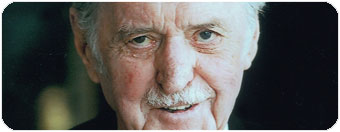
 A member of the Bar told me that he admired Killen because Killen always recognised him and spoke to him. That is a common response. That was his style. To walk down the street with him was an experience. He would be stopped every twenty metres with people wishing him well. They all loved him. He had a rugged face and a typical Air Force moustache which made him instantly recognisable. He was regularly sought for comment in newspapers and on television. He had a very public profile. His image was a “household word” one might say.
A member of the Bar told me that he admired Killen because Killen always recognised him and spoke to him. That is a common response. That was his style. To walk down the street with him was an experience. He would be stopped every twenty metres with people wishing him well. They all loved him. He had a rugged face and a typical Air Force moustache which made him instantly recognisable. He was regularly sought for comment in newspapers and on television. He had a very public profile. His image was a “household word” one might say. His peers at the Bar, in the early days, treated Killen with mild amusement. Many took the view that his kind of advocacy belonged more to the other place. Yet he was successful in a variety of actions, so Judges and juries must have seen him differently.
His peers at the Bar, in the early days, treated Killen with mild amusement. Many took the view that his kind of advocacy belonged more to the other place. Yet he was successful in a variety of actions, so Judges and juries must have seen him differently. He had a wonderful eightieth birthday party at the Irish Club. Gough Whitlam spoke and so did Alexander Downer. Gough was Gough of course, and Downer’s words were marvellous, yet he had not been in Parliament with Jim. Downer climbed off a plane from Korea, came to the Club, made the speech and was off again. Others spoke too, the Irish Pipe Band played, Irish Dancers danced and Brian Nason added a touch of Australiana with “The Man from Snowy River”. (Tony Morris was late). It was the best night.
He had a wonderful eightieth birthday party at the Irish Club. Gough Whitlam spoke and so did Alexander Downer. Gough was Gough of course, and Downer’s words were marvellous, yet he had not been in Parliament with Jim. Downer climbed off a plane from Korea, came to the Club, made the speech and was off again. Others spoke too, the Irish Pipe Band played, Irish Dancers danced and Brian Nason added a touch of Australiana with “The Man from Snowy River”. (Tony Morris was late). It was the best night. Lord Denning ranked amongst his friends. Denning inscribed the first of his quintet of autobiographical tomes for Sir James. George Bush senior also shared his friendship. James had flown in US Air Force 2 when Bush senior was Vice President. He was a close friend of several members of the Dixon & Barwick Courts, especially Barwick, Menzies and Taylor. One might perhaps feel that Killen related best to the “larrikin” element on the Court.
Lord Denning ranked amongst his friends. Denning inscribed the first of his quintet of autobiographical tomes for Sir James. George Bush senior also shared his friendship. James had flown in US Air Force 2 when Bush senior was Vice President. He was a close friend of several members of the Dixon & Barwick Courts, especially Barwick, Menzies and Taylor. One might perhaps feel that Killen related best to the “larrikin” element on the Court. He sat on the Racing Appeals Tribunal for some years in the late 1990s and early this century. Mr Leo Williams was Chairman and Mr Dennis Standsfield the second member. Sir James was a “softie” when it came to penalising owners, trainers etc. The other Tribunal members had to keep a tight rein. He would tell me of the hearing and when referring to the penalty would invariably add “The poor beggar”. One greyhound owner said he had his dog in the car and would like to bring it into the court. “You would get on well with him,” he told Killen, “you have similar personalities”.
He sat on the Racing Appeals Tribunal for some years in the late 1990s and early this century. Mr Leo Williams was Chairman and Mr Dennis Standsfield the second member. Sir James was a “softie” when it came to penalising owners, trainers etc. The other Tribunal members had to keep a tight rein. He would tell me of the hearing and when referring to the penalty would invariably add “The poor beggar”. One greyhound owner said he had his dog in the car and would like to bring it into the court. “You would get on well with him,” he told Killen, “you have similar personalities”.